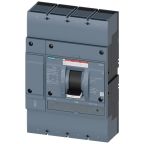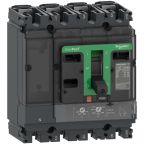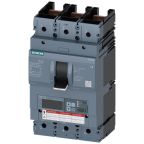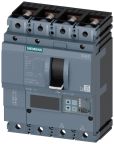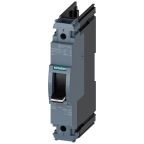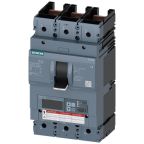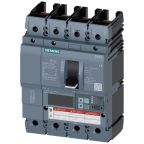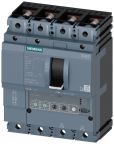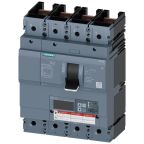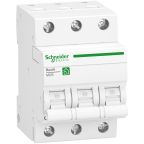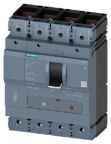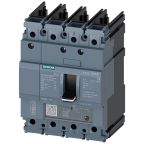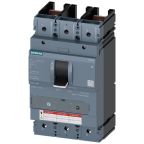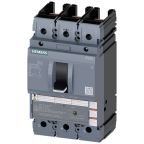MCCBs
Moulded Case Circuit Breakers (MCCBs or MCC breakers) are essential protective devices that interrupt and safeguard electrical circuits from overcurrent and short circuits. These MCCBs are designed to protect a wide range of electrical systems and equipment, making them suitable for low and medium-voltage applications.
MCCBs can handle significantly higher current levels than Miniature Circuit Breakers (MCBs). MCCBs typically have a rated current of 10 amps to 2,500 amps and a breaking capacity of up to 200 kA.
How Does an MCCB Work?
An MCCB comprises a current-carrying bimetallic strip, a magnetic trip element, and a mechanical latching mechanism. When the current flowing through the MCCB exceeds the set limit, the bimetallic strip heats up and bends, causing the latch to release and trip the breaker. The magnetic trip element detects the magnetic field generated by high fault currents and triggers the breaker to trip.
Difference Between an MCB and an MCCB
Miniature Circuit Breakers (MCBs) are designed for low-current circuits, typically up to 125 amps. They feature a breaking capacity of up to 10 kA and are engineered to trip quickly during short circuits or overloads. MCBs are commonly used in residential and commercial buildings to protect individual circuits, such as lighting and power circuits.
In contrast, Moulded Case Circuit Breakers (MCCBs) are built to manage higher current levels (depending on the specific rating) and protect larger electrical systems and equipment. They offer a higher breaking capacity compared to MCBs, making them ideal for more demanding applications.
MCCB Circuit Breaker Types
MCCBs are categorised into different types based on their trip characteristics, each suited for specific applications:
Type B
Type B MCCBs are designed to trip quickly in response to overloads and short circuits. They are commonly used for protecting resistive loads, such as lighting circuits and heating elements, where surge currents are minimal.
Type C
Type C MCCBs have a higher trip threshold than Type B and are suitable for circuits with moderate inrush currents, such as those found in household appliances, motors, and transformers.
Type D
Type D MCCBs have the highest trip threshold and are designed for circuits with high inrush currents, such as those found in large motors, transformers with high inrush currents, and some types of industrial equipment.
Type K
Type K MCCBs are specifically designed for motor protection, offering a trip characteristic that allows for high starting currents while still providing protection against overloads and short circuits.
Type Z
Type Z MCCBs are highly sensitive and designed to protect sensitive electronic equipment, such as computers and servers, where even small overcurrents can cause damage.
Key Features of an MCCB Breaker
MCCBs come with various features that enhance their functionality and safety. Here are some key features to take note of:
- Interrupting Capacity: The interrupting capacity of an MCCB indicates the maximum current it can safely interrupt in the event of a short circuit. It is crucial to choose an MCCB with an interrupting capacity that exceeds the potential fault current in the circuit.
- **Trip Current: **The trip current is the current level at which the MCCB will trip and interrupt the circuit. This value is adjustable in some MCCBs, allowing for customisation based on the specific application.
- Number of Poles: MCCBs are available with different numbers of poles, typically ranging from one to four. The number of poles determines how many live conductors the MCCB can protect.
- Operating Voltage: MCCBs are designed for specific operating voltages, typically ranging from 240V to 690V. It is crucial to choose an MCCB with an operating voltage that matches the system voltage.
- Thermal and Magnetic Protection: MCCBs offer both thermal and magnetic protection. Thermal protection guards against overloads, while magnetic protection provides instantaneous tripping in case of short circuits.
Industrial Applications of MCCBs
MCCBs are commonly used in a wide range of applications, including:
Discrete Manufacturing
In discrete manufacturing, MCCBs are often utilised to protect individual machines and equipment on production lines, ensuring safe operation and preventing damage from electrical faults.
Process Manufacturing
MCCBs are used in process manufacturing to protect critical equipment, such as motors, pumps, and control systems, ensuring continuous operation and preventing costly downtime.
Energy & Utilities
MCCBs play a vital role in power distribution and control systems, protecting electrical infrastructure and ensuring the reliable supply of electricity.
Facilities & Intralogistics
MCCBs protect electrical systems in various facilities, including warehouses, data centres, and commercial buildings, ensuring workplace safety and preventing disruptions to operations.
Maintenance Tips for Moulded Case Circuit Breaker
Regular maintenance is essential to ensure the reliable operation and longevity of MCCBs. Here are some key things to note:
Inspection
Periodically inspect the MCCB for any signs of wear or damage, such as loose connections, burnt contacts, or cracks in the casing. If any damage or excessive wear is found, the MCCB should be replaced promptly to ensure continued safety and functionality.
Lubrication & Cleaning
Routinely lubricate moving parts and clean the MCCB to remove dust and debris that could affect its operation. It is best to use the appropriate lubricants and cleaning agents recommended by the manufacturer.
Testing
Regular testing of MCCBs is crucial to verify their functionality and ensure they will provide reliable protection in the event of a fault. There are different types of tests to conduct, such as:
Insulation Resistance Test
This test measures the insulation resistance between the MCCB's current-carrying parts and its earth connection. To perform this test, first disconnect the MCCB from the circuit. Then, using an insulation resistance tester (also known as a Megger), apply a high voltage between the phases and across the supply and load terminals of the MCCB.
If the measured insulation resistance is lower than the manufacturer's recommended value, the MCCB may not be providing adequate protection and should be replaced.
Contact Resistance test
The contact resistance test measures the resistance across the MCCB's contacts when they are closed. This is done by connecting a low-resistance ohmmeter across the closed contacts of the MCCB. The measured value should be very low, as MCCBs are designed to allow operating current to flow through with minimal losses.
If the measured contact resistance is higher than the manufacturer's specified value, it could indicate worn or damaged contacts, requiring further investigation or replacement of the MCCB.
Tripping Test
This test verifies that the MCCB trips correctly at its designated trip current, ensuring that it will provide reliable protection against overloads and short circuits. The test involves applying a controlled current to the MCCB that exceeds its rated value, typically using a high-current test set.
Observe the MCCB's response time and ensure it trips within the specified time frame. This test should be conducted at the end of the maintenance procedure, as the high currents used can increase the temperature of the contacts and insulation, potentially affecting the results of other tests.
Trusted Moulded Case Circuit Breakers Manufacturer, Supplier & Distributor in Australia
RS is your reliable source for high-quality moulded case circuit breakers. We stock an extensive range from industry leaders like Schneider Electric, ABB, and our own RS Pro line. Our selection spans various types and sizes at competitive prices, ensuring you find the perfect MCCB for your application.
We also carry other essential circuit breaker components, such as fuses and miniature circuit breakers, to provide comprehensive solutions for your circuit protection needs. Buy electrical MCCBs, adjustable MCCBs, automatic MCCBs and other accessories online today.
Buy MCCBs Online from RS
We provide dependable delivery from as soon as the next working day. For approved business account customers, delivery is free on all orders over $40. We also welcome offline orders via telephone, email, or fax. For these orders, business account customers with a valid ABN enjoy free delivery on all orders over $80. Convenient self-collection from our Sydney branch is also available.
For more details, please refer to our Delivery Page.
Popular Searches
Related links
- Temperature Transmitters
- Schneider Electric Fixed Mount
- PR Electronics 5437 Temperature Transmitter Linear Resistance RTD Voltage Input, 7.5
- Rosemount 644 Temperature Transmitter mV RTD 42.4 V dc
- PR Electronics 6300 Temperature Transmitter Linear Resistance Thermocouple Input, 7.2 → 30 V dc
- PR Electronics 5300 Temperature Transmitter Linear Resistance Thermocouple 7.2 → 35 V dc
- PR Electronics 5300 Temperature Transmitter Linear Resistance Thermocouple 8 → 35 V dc
- PR Electronics 6300 Temperature Transmitter Linear Resistance Thermocouple 8 → 30 V dc

